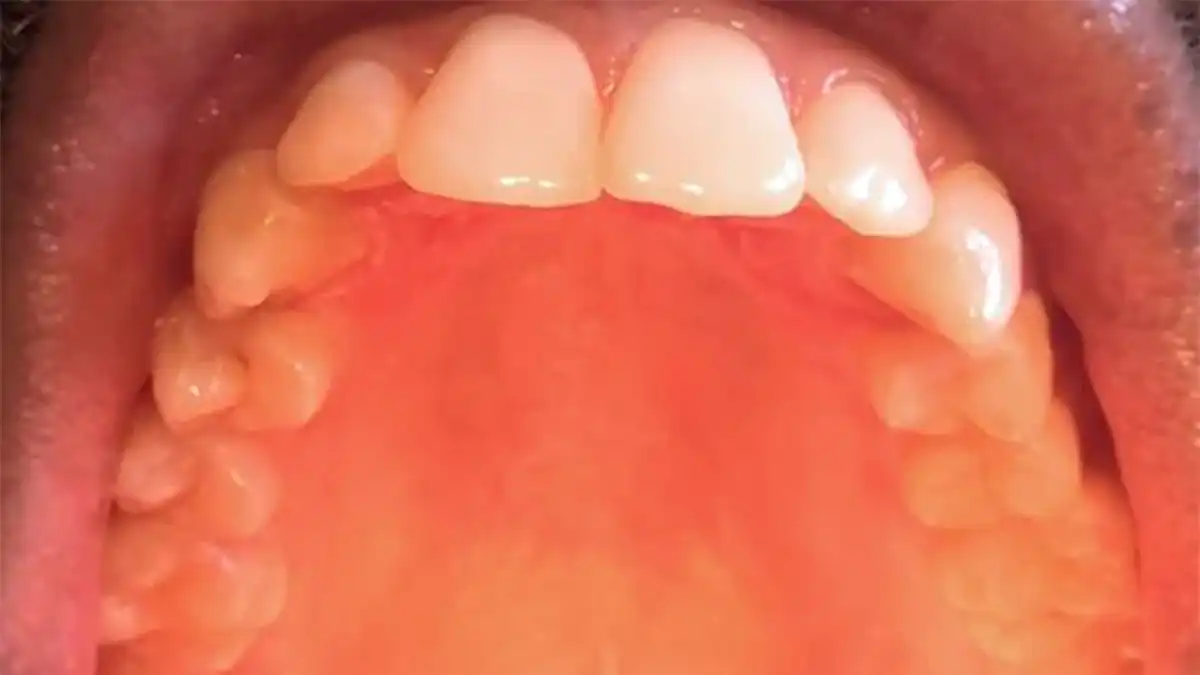8 Reasons Why The Roof Of Your Mouth Is Itchy


An itchy roof of the mouth (palate) sensation isn’t normal. Anytime the roof of mouth itchy feelings pop up, the first thing to come to most people’s minds is an allergic reaction. For example, you might have a food allergy to something like shellfish or peanuts, and itchiness or hives is one of the first signs you’ve been exposed.
Or, you just have really bad seasonal allergies/hay fever and it makes your entire body start to itch. But there are actually other common factors that can make the roof of mouth itchy. Knowing what to look for can help you reverse the irritation and prevent recurring infections.
Common Symptoms
As straightforward as it sounds, itchy roof of mouth sensations feels just like that: the roof of your mouth is itchy. You may or may not have other areas of your body that itch and tingle as well. It could even feel like a tiny pinprick or tingles across different areas of your mouth and face, such as inside of your cheeks, in the back of your throat, and over your lips.
You’ll probably feel symptoms such as itchiness, a rash, burning, pinpricks, or tingling in the roof of your mouth. An itchy roof of the mouth is not to be confused with “burning mouth syndrome” which is an entirely different subject that we’ll have to save for another day!
Common Causes
Understanding the most common causes of what makes your roof of mouth itchy will help you use the process of elimination to deal with the symptoms (and keep them from coming back.)
1) Allergy
Symptoms
Experiencing an allergic reaction can cause symptoms of itchiness, trouble breathing, hives, sneezing, or even nasal congestion.
Treatment
An antihistamine (allergy medication such as Benadryl) is great for minor allergic reactions. However, if the itchy feeling starts to affect your airway, head to the nearest emergency room and use an Epi-pen if one is available.
2) Cold Sores
“Fever blisters” or cold sores are caused by a specific strain of herpes virus (similar to chickenpox and shingles.) They typically cause a tingling, burning, or pinprick sensation once they start to develop.
Symptoms
Cold sores tend to first appear as an itchy, tingling sensation in the area where they’re about to form. A few days later, a small area of blisters will develop and turn into a larger, circular crevice in the skin.
Treatment
Typically, cold sores run their course in about 10-14 days. However, if you’re prone to frequent fever blisters, your dentist can prescribe a special medication that will shorten their life span. Laser therapy is also helpful!
3) Anaphylaxis
Symptoms
Anaphylaxis makes it difficult to breathe. You can also experience dizziness, hives (a rash all over your body), rapid heartbeat, nausea, or complete loss of consciousness.
Treatment
Immediate action is necessary. If possible, locate and administer an Epi-pen from a nearby emergency kit. Call 911. Head directly to the emergency room.
4) Yeast Infection
This fungal infection is common in people who wear removable appliances like dentures and partials, individuals with autoimmune disorders or have vitamin deficiencies. It can also occur when natural oral flora is imbalanced, which is fairly common after taking antibiotics.
Symptoms
An itchy roof of the mouth, lips, cheeks, tongue, or back of the throat. The white residue wipes off of the tissues. White accumulation around the corners of the mouth.
Treatment
Improved oral hygiene, cleaning removable prosthetics, probiotics, and anti-fungal medication (such as nystatin.)
5) Itchy Mouth After Eating (Food Allergies)
Having a food allergy is one of the most common causes of developing an itchy roof of mouth. If you feel like your mouth is tingly or itchy when eating a new food, it could be that you’re having an allergic reaction.
Symptoms
A food-induced allergy will almost immediately cause oral symptoms such as swelling to the lips, itchy roof of mouth, or in severe cases even restriction in the airway.
Treatment
Depending on the severity of your food allergy, you may only need an over-the-counter antihistamine (Benadryl) and to avoid the food in the future. But if you’re known to have severe food allergies, keep an Epi-pen on hand and wear a medical ID bracelet so that someone can call 911.
6) Oral Thrush
Symptoms
Thrush can cause white residue inside of the mouth, raw-looking oral tissues, and itchy roof of mouth. Babies may be irritable and not want to eat well.
Treatment
Discuss antifungal treatment with your dentist, doctor, or pediatrician. Wipe baby’s mouth after every feeding with a clean, damp cloth.
7) Viral Infection
Certain types of viruses can cause itchy, burning sensations. Whether you have the virus that causes cold sores or one that’s affecting your overall body, your mouth and upper respiratory tract can easily be affected.
Symptoms
In addition to irritation or burning roof of mouth, you might also notice other common viral symptoms such as sneezing, a runny nose, sore throat, or swollen lymph nodes.
Treatment
Viruses such as the common cold typically run their course. However, the flu or other types of viruses may require prescription antiviral meds. Rest, stay hydrated, and listen to your body.
8) Anxiety
Although less common, anxiety can cause sensations of tingling or burning around the lips and mouth.
Symptoms
Anxiety affects everyone differently. You might have increased respiration, perspiration, and heart rate. Or you could feel dizzy and lightheaded. For some people, tingling in the mouth or other parts of the body is normal.
Treatment
Talk with a licensed mental health professional about a customized plan to help you cope with anxiety as it relates to your unique situation.
Preventing Itchy Roof Of Mouth
If you find that the roof of mouth itchy sensation is something that flares up frequently, it’s important to address the cause before a more serious condition (such as anaphylaxis or death) becomes a factor. Your doctor may recommend allergy testing to determine the exact types of foods or pollens that you’re allergic to, so that you can eliminate them from your diet. Or they could have you stick to a very strict meal plan, gradually adding foods back into your diet so that you can identify exactly which ones are bothering you.
If your roof of mouth itchy feeling is because of an infection such as yeast or thrush, after you’re treated with antibiotics, you’ll need to adjust your oral care routine. This includes rigorous cleaning of any removable appliances – such as dentures or retainers – changing out your toothbrush and cleaning your mouth out regularly throughout the day.
Autoimmune disorders make some people more prone to getting thrush or itchy mouth symptoms. So always be sure to communicate with your dentist and doctor to find the right regimen that keeps your natural oral flora in the perfect balance. For example, if you’re taking antibiotics, your dentist may also recommend an oral probiotic to maintain a healthy number of “good” bacteria.
Relieving Itchy Mouth At Home
First off, use a process of elimination to determine what’s causing your itchy roof of mouth. If you require medical care, speak to a doctor. Otherwise, there are some tips your dentist offers to help minimize irritation and itchiness so that it doesn’t bother you so much.
- as long as you’re cleared to do so, consider taking an anti-histamine or similar allergy medication to prevent chronic flare-ups
- practice good oral hygiene to minimize bacterial or yeast infections
- have your doctor or dentist call in an antifungal medication (such as nystatin)
- keep an Epi-pen on hand for emergencies
- rinse your mouth regularly with a non-alcoholic mouthwash
- ask your dentist about prescribing “miracle mouthwash” for when symptoms are moderate to severe
- maintain a restrictive diet if you’re known to have specific types of food allergies
- take an oral probiotic each day or eat foods rich in probiotics, such as yogurt
- if tingling/burning is anxiety-induced, practice good self-care, meditation, and mindfulness exercises
Overcoming A Itchy Roof Of Mouth
There are at least a dozen different things that can give you an itchy roof of mouth (palate). They range from allergic reactions to food and oral infections such as thrush, to anxiety attacks and virus-related cold sores. Understanding how roof of mouth itchy-sensations work, how often they flare up, and the extent of their severity can help you determine the best route of treatment.
If the symptoms are minor to moderate, talk with your dentist or physician to determine the underlying cause and how to prevent it from coming back. You might need to adjust your home care routine or take a prescription medication. Bottom line, if you think you’re experiencing an allergic reaction to something you ate, use an Epi-pen and head to the nearest emergency room.

Make your inbox smile!
Subscribe






